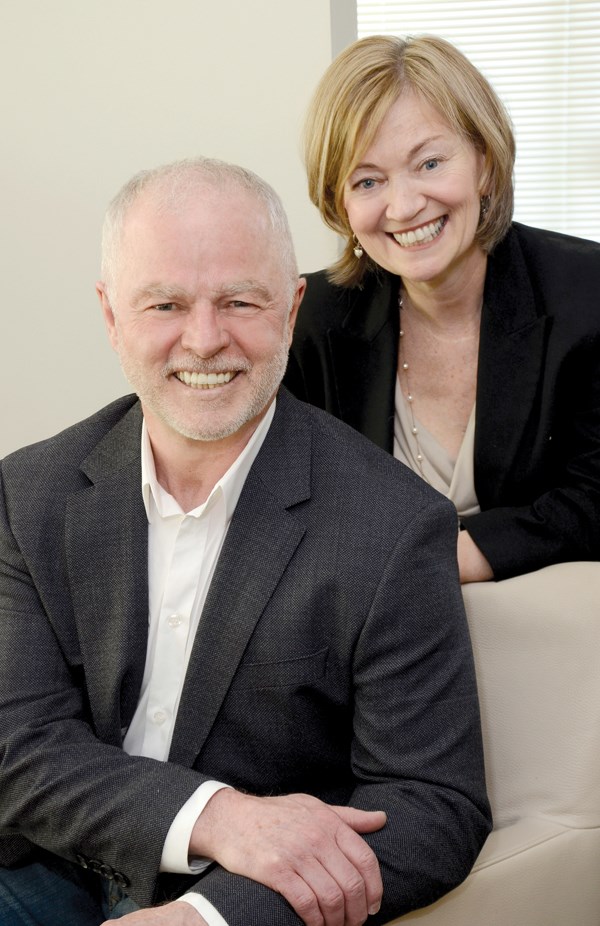Michael Pond had not yet hit rock bottom when he set out on the streets of the Downtown Eastside in October 2008.
His remarkable story would take several more turns, some for the worse, before sobriety would finally take hold. The Couch of Willingness: An Alcoholic Therapist Battles the Bottle and a Broken Recovery System is the West Vancouver resident's harrowing story told through a raw, cinematic lens with coauthor Maureen Palmer. Pond, a psychotherapist, had a successful practice in Penticton, but excessive alcohol consumption soon got the better of him. He lost his practice, his home and his wife and family.
As his drinking became worse, Pond says, he often felt he should write about his experience. Then, after a year of sobriety and getting back into the workforce, Pond met Palmer on the dating site Plenty of Fish.
"Our very first date, I met her at Steamworks (Brew Pub), I arrived on transit and we went in there and sat down," he says.
"She ordered a chardonnay and I ordered my cranberry and soda."
Palmer, a seasoned journalist of 20 years for the CBC, turned indie filmmaker, questioned Pond as to why he had not ordered alcohol.
"So I just slowly started peeling away the layers and each time I would tell her another little layer, she would just keep saying, 'We have to write a book,'" says Pond. "I said 'Well, Maureen I've been hearing that for a while,' and she goes 'No Mike, this is an unbelievable story, you have an unbelievable story, we have to write a book.'" Pond wrote 20 pages, gave it to Palmer for her opinion and she quickly steered him in the right direction. They continued writing together, with Pond inserting his knowledge as a psychotherapist and Palmer illustrating his experience with a cinematic flare.
"I could just feel myself changing, I could feel myself kind of evolving and healing really just from doing the writing," says Pond.
The book took almost three years to complete but Pond says the response has been overwhelming.
"People will show up or phone, I get unbelievable emails from old friends and colleagues," he says.
A lot of his relationships were healed through the process, says Pond, including with his ex-wife and three sons.
"It was a horrible ordeal for her to go through, to watch her husband, the father of her children, just completely unravel and watch him self-destruct and not know what to do," he says of his ex-wife.
"But at the book launch, she came, we invited her, she came, and my three sons came and the in-laws, we had my family on one side, my mom and my aunties, brother and sisters, the room was just full of people."
The experience has also given Pond a new level of empathy when treating his own clients.
"I really try to just approach people from a place of absolute nonjudgment and I don't get into labelling. I've been trained in that medical psychiatric model and it's all about diagnosing and labelling, and we need to do that at some level to come up with a good treatment, a good care plan, but in terms of one-to-one relationship and doing counselling or psychotherapy, it needs to be about non-judgment and me demonstrating that I understand and I know how you feel, and you know what? I can say that now because I've been there," says Pond.
His professional voice as a counsellor was often present in his mind throughout his ordeal.
"I've worked in this field for so many years and then here I am in my mid-50s actually feeling, knowing I have clinical depression, knowing I have a generalized anxiety disorder, knowing that I'm having symptoms of psychosis, hearing voices and extreme paranoid ideation and losing touch with reality and losing touch with the sense of self."
Pond's journey took him through rat-infested recovery houses and a 12-step recovery program.
"When somebody relapses with alcohol, we kick them out of treatment," says Pond. "It's all based historically on you're drunk, therefore you're weak and flawed and defective and sinful and immorally correct and on and on it goes."
He says those models are really about using punishment and confrontation.
"The system has to change," says Pond. "The funds need to go into research, the funds need to go into education, the funds need to go into prevention and families."
Since the book came out, Pond says he gets asked to speak "quite a bit now" and it's become almost a level of activism.
Pond and Palmer hope the book will change attitudes and conversations about treatment.
"It's interesting because I had to just become completely open and completely honest and basically bare my soul, and I agonized over doing that in the beginning because I was also trying to rebuild a practice," says Pond.
"Finally I just said 'You know what, just tell it all,' and what it's done is it's opened a lot of doors, I think, for people that have a lot of shame and stigma to know that it's OK to disclose your pain and admit you have a mental illness and admit that you have a substance abuse problem."



